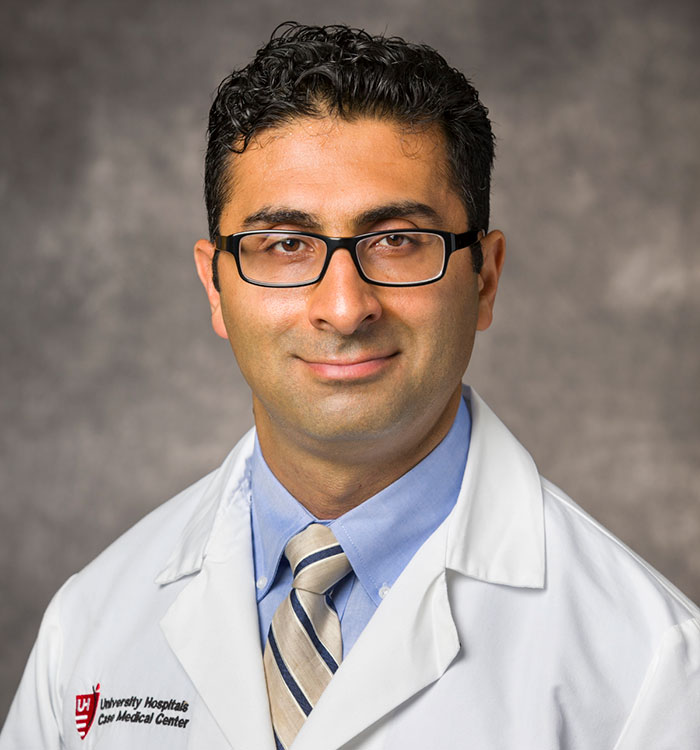Multiple Myeloma Patients at UH Seidman Cancer Center First in Ohio to Receive New CAR T-Cell Therapy
July 19, 2021
Patients also have access to promising clinical trial of vactosertib and pomalidomide
Innovations in Cancer | Summer 2021
Patients being treated for Multiple Myeloma at UH Seidman Cancer Center are the first in Ohio to receive the recently approved CAR T-cell therapy to treat the disease – ABECMA, produced by Bristol Myers Squibb (BMS). ABECMA targets B-cell maturation antigen, or BCMA, a molecule that is almost exclusively expressed on myeloma cells and B cells, to mount a powerful, lethal attack against cancer cells.
 Ehsan Malek, MD
Ehsan Malek, MDAccording to Ehsan Malek, MD, an oncologist and hematologist at UH Seidman who specializes in Multiple Myeloma, it was University Hospitals’ preparation and investment in CAR T infrastructure that made it possible to be the first to offer ABECMA to patients with Multiple Myeloma.
“We at University Hospitals have the capability in our Cellular Therapy Lab to produce our own CAR T-cells in nine days for other blood cancers,” he says. “That helps a lot in terms of infrastructure for ABECMA. We were also in very close collaboration with BMS to build our workflow before the FDA approved the drug. We allocated lots of resources to this, to be able to administer as soon as possible after we got FDA approval.”
Now that ABECMA is available and being administered, Dr. Malek says he’s optimistic about the difference this new therapy at UH Seidman Cancer Center will make for his patients.
“I commonly encounter scenarios that patients are in critical need for a drug with new mechanism of action to control the rampant disease,” he says. “Now, with approval of ABECMA, as the first-in-class CAR T-cell that targets BCMA, we are able to deliver a single-infusion and effective personalized therapy to achieve long remissions.”
This is a new shift from classic anti-myeloma therapies that typically rely on continuous and long-term therapy to treat a chronic cancer such as Multiple Myeloma; it will be welcome news to patients, he says.
“The main benefit of ABECMA is that it is a one-shot, one-time therapy,” Dr. Malek says. “Usually patients with Multiple Myeloma are on continuous therapy for a long time, with its own side effects and impact on patient’s lifestyle. But with this new CAR T-cell therapy, we have the opportunity to have just one-time treatment and then watch the patient without any need for chemotherapy. This is important in terms of quality of life. Without chemotherapy, patients can enjoy remission.”
Dr. Malek says the science that led to the approval of ABECMA is robust. The KarMMa trial evaluating the therapy enrolled heavily treated Multiple Myeloma patients who had already had the main class of chemotherapy agents used for Multiple Myeloma, namely proteasome inhibitors, immune modulatory agents, and anti-CD-38 therapies.
“There was a high response rate, close to 73%, and with a median follow up period of 24.8 months, at least half of patients achieved 8.6 months or longer remission time after single therapy with ABECMA with no continuous therapy afterward,” Dr. Malek says.
“This is a very remarkable response and quite a long remission time,” Dr. Malek adds. “KarMMa was the first landmark trial that facilitated the CAR-T for myeloma patients. When patients exhaust all these three main classes of drug, they don't have many options really to enjoy long remissions. CAR-T therapy gives them this opportunity, as shown in this important KarMMa trial. With ABECMA approval, it could be just a beginning for stronger CAR Ts to be available for patients with Multiple Myeloma in near future.”
Beyond ABECMA, Dr. Malek is also offering new options to Multiple Myeloma patients through an investigator-initiated clinical trial, developed at University Hospitals all the way from bench research, to pre-clinical data to it now being tested in patients. The current phase Ib trial studies the side effects and best dose of vactosertib when given together with pomalidomide in treating patients with recurrent or refractory Multiple Myeloma.
The small-molecule oral medication vactosertib inhibits TGF beta, a main cytokine that leads to immune suppression in myeloma, Dr. Malek says.
“Multiple myeloma patients always suffer from immune suppression,” he says. “And that is a very important aspect of this disease, because it leads to infection and tumor progression. If you can stimulate their immune system, you help a lot in terms of controlling disease. This immunotherapy approach inhibits TGF beta signaling pathways that mediate main immune suppression in myeloma patients. It’s an oral medication -- weekdays on, weekends off. It’s been studied in other types of cancers and is a very tolerable therapy.”
“Pomalidomide is a standard-of-care third generation immunomodulator agent that’s been FDA- approved since 2012,” Dr. Malek adds. “Our data shows that it has strong synergistic activity with vactosertib. We’ve had great results in terms of response efficacy, as well as toxicity and tolerability of this regimen”.
Another important aspect of this trial is that it is a corticosteroid-free regimen, Dr. Malek says.
“Historically, we use high-dose dexamethasone for treating Myeloma patients. It's amazing when you delete steroids, how many fewer side effects patients have. I believe this is a stepping stone toward the new age of myeloma therapy that is immune therapy without the steroids. This is a UH- and Cleveland-born approach and technology that we are very proud of. We hope to get it to even further stages for all patients.”
For more information on ABECMA at UH Seidman Cancer Center or the clinical trial of vactosertib and pomalidomide, please email Ehsan.Malek@UHhospitals.org.
Contributing Expert:
Ehsan Malek, MD
Hematology/Oncology
UH Seidman Cancer Center
Assistant Professor of Medicine
Case Western Reserve University School of Medicine


